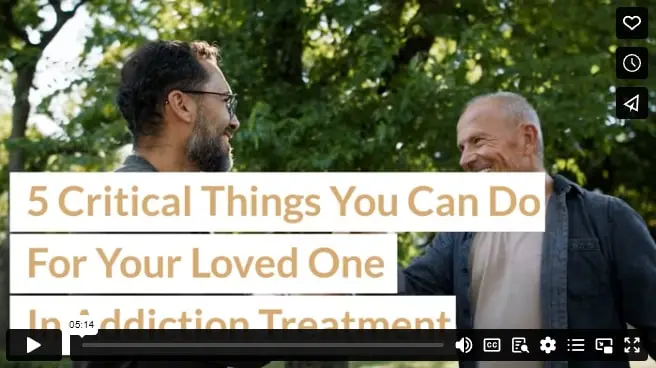Addiction affects many people, not just the ones struggling with the disease. Those include family, friends, co-workers, and neighbors. However, recognizing a problem and doing something about it are two entirely different things. Those closest to a person with substance use disorder (SUD) often feel the most helpless in trying to intervene.
Chances are, you have someone in your life who struggles or has struggled with an SUD. According to the National Center for Drug Abuse Statistics, in 2020, more than 37 million Americans 12 and older used illicit drugs within the past month. That number represents a 3.8% increase year-over-year. Of those, over a quarter qualified as having a drug use disorder. The same survey found that nearly 139 million Americans 12 and older drank alcohol in the past month, and more than 20% had an alcohol use disorder (AUD).
Contrary to what you might think, you have considerable power and influence when it comes to helping a loved one with addiction. Here at Renaissance Ranch, a men’s treatment center with locations in Utah and Idaho, we believe there are some essential things you can do to assist them in finding their path to recovery and staying on it.

(Alex Green/Pexels)
1. Educate Yourself
Throw away your misconceptions and focus on facts. You can do this by learning about addiction, its causes, and available treatment options from trusted medical and professional sources. These include SAMHSA (Substance Abuse and Mental Health Services Administration), the AMA (American Medical Association), local AA (Alcoholics Anonymous) and NA (Narcotics Anonymous) organizations, and your family doctor or psychiatrist.
Another excellent idea is to contact addiction recovery centers in your area to determine treatment specialties, costs, and whether or not they accept insurance. Some local treatment providers may also offer free or low-cost informative resources. For example, Renaissance Ranch provides its regular Family Addiction Recovery podcast series that costs nothing and is open to the public.
2. Communicate with Compassion
Some people might call this ‘staging an intervention.’ You want to let your loved one know how much you love them and are concerned for their welfare. Stick to specifics and ask questions without judgment or shaming. Remember, separate the person you love and care about from their addiction.
For example, you can say, “I was terrified when I found out you were arrested for drunk driving. It’s not like you to act irresponsibly like that. Is there something going on in your life you would like to share with me? I love you, and I’m always here to listen.”
Addiction is incredibly isolating. It will make a massive difference for your loved one to know that no matter what, you still love them and are ready to support them in their recovery journey.
3. Set Healthy Boundaries
It’s essential to separate care and support for the person from the tacit acceptance and enabling of their behavior. Setting healthy boundaries will protect you and the rest of the family from manipulation and potential physical and emotional harm.
Enabling behavior manifests itself in various forms, including making excuses for the person and trying to mitigate the consequences of their actions. Do these sound familiar? “He had a tough day at work, so it’s OK that he came home drunk,” or “She’s in college! So she missed a few classes because she was partying too much. It’s normal.”
Helping them pay rent when they can’t because they spent all their money on drugs or alcohol is enabling, not supportive. Your loved one must endure the painful consequences of their behavior if they are going to develop a desire to change, even if that means eviction, failing their classes, landing in jail, or other agonizing outcomes.
4. Encourage Seeking Professional Help
This tip ties in well with our first suggestion: educate yourself. Armed with information, you will be prepared to encourage your loved one to get professional addiction treatment and show them where they can find it. Help them to understand that substance use disorder is a disease like any other. Trying to fix a broken arm or fight cancer without medical assistance doesn’t make sense. Likewise, attempting to overcome addiction alone isn’t a great idea, either.
There’s no shame in taking a beat and turning to knowledgeable and caring people – often former substance abusers themselves – who can help them get their life back on track.
5. Participate in Recovery
Family members can support their loved one’s recovery in many ways, from paying for treatment to giving them rides to and from outpatient and therapy services. And while these are great ways to help, one of the most effective approaches to ensure lifelong success is participating in treatment with them.
Research shows that family involvement in substance abuse care is essential to a person’s addiction recovery plan. Gone are the days when family members were seen as part of the problem. Today, they are a key part of the solution.
Recovery is for everyone, not just the individual with a diagnosed substance use disorder. “Sustained sobriety depends on healthy, supportive relationships,” said Preston Dixon, COO at Renaissance Ranch. “Addiction is a family disease that needs family-based solutions. We offer five family group classes each week, which provide support and are highly educational,” he continued. Other free resources for family and friends include regular webinars and podcasts.
One family member of a former Ranch patient attested, “We learned … that healing is possible, for ALL of us, if we are willing to work on our recovery just as our addicts must work theirs! Our journey of family recovery has been our greatest blessing.”
If you want to know more about relation-focused recovery or are interested in one of our men’s treatment centers throughout the Intermountain West, call us at 855-736-7262.
Infographic
Millions face the challenges of substance use disorders, impacting individuals and their families. Family involvement plays a vital role in successful recovery. Engage in treatment sessions or listen to relevant podcasts to provide support. Remember that recovery isn’t solely for the individual with the substance use disorder; it’s a journey involving the entire family. Discover vital steps in our infographic.
Video


